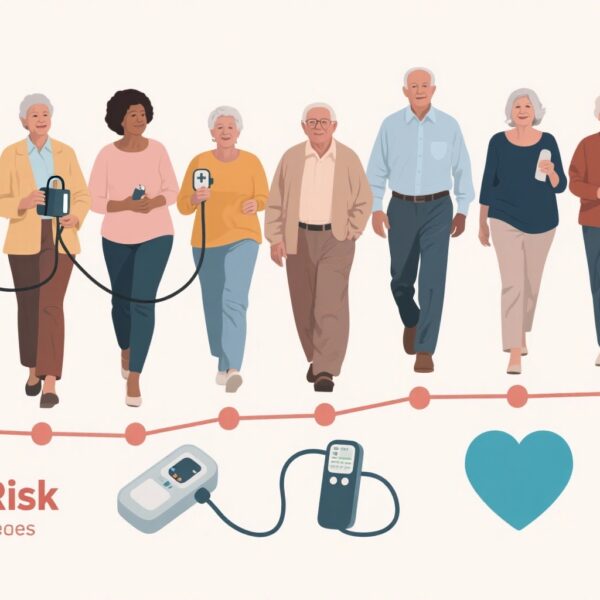Highlight
The Hospital Frailty Risk Score (HFRS), originally developed for older populations, correlates significantly with length of hospital stay, in-hospital mortality, and hospital costs in adults aged 18 and older across England. The study reveals that increased frailty risk is associated with progressively longer hospital stays and higher costs across all ages, with the greatest impact seen in older groups. Interestingly, the relationship between frailty and in-hospital mortality peaks around age 65-74 years and attenuates afterward, highlighting nuanced risk profiles. These findings support wider implementation of the HFRS across all adult age groups, promoting early frailty identification and intervention.
Study Background
Frailty is a complex clinical syndrome characterized by decreased physiologic reserves and increased vulnerability to adverse health outcomes. While extensively studied in populations older than 75 years, frailty increasingly affects younger adults with chronic comorbidities. The Hospital Frailty Risk Score (HFRS), derived from routine administrative data, has proven effective in stratifying risk among older hospitalized patients. However, its generalizability to a broader adult population remains unclear. Understanding how frailty influences hospital outcomes across the adult lifespan is essential for delivering personalized and cost-effective care, allocating resources efficiently, and improving prognostication.
Study Design
This retrospective observational cohort study analyzed a nationally representative 5% random sample of emergency hospital admissions in England from April 2011 to March 2019. The sample included 1,478,554 admissions representing 653,294 patients aged 18 years and older admitted to National Health Service (NHS) acute hospitals. Frailty was categorized by the Hospital Frailty Risk Score into zero (HFRS=0), low (0<HFRS<5), intermediate (5≤HFRS≤15), and high (HFRS>15) risk groups. The study evaluated associations between frailty categories and three key outcomes: length of hospital stay, in-hospital mortality, and hospital costs. Statistical analyses employed Poisson regression for length of stay, probit for mortality probabilities, and generalized linear models for costs, adjusting for patient demographics, clinical factors, and temporal trends. Separate analyses were conducted across nine precise age bands (18-24 through ≥95 years) to examine age-specific effects.
Key Findings
The prevalence of high frailty risk increased markedly with age, from 0.2% in the youngest group (18-24 years) to 42.0% among the oldest (≥95 years), indicating frailty remains a relevant concern even in younger adults, albeit at low frequency.
There were statistically significant associations across all age groups showing that higher frailty risk correlated with longer hospital stays and increased hospital costs. In patients aged 18-24 years, high frailty risk resulted in a 4.5-day longer stay (95% confidence interval [CI] 3.8-5.3) and £1,217 greater hospital costs (£796-£1,638) compared to those with zero frailty risk. Among those aged ≥95 years, these differences were even more substantial, with a 15.3-day longer stay (95% CI 13.5-17.1) and £2,557 higher costs (£2,234-£2,880).
The relationship between frailty and in-hospital mortality rates was significant and varied by age. The association increased with age up to 65-74 years, where patients with high frailty risk had a 2.3% greater probability of hospital death (95% CI 1.99-2.61) relative to those with no frailty. Beyond this age, the strength of association diminished, suggesting multifactorial influences on mortality risks among the oldest patients or possible survival bias.
These outcomes persisted after adjusting for confounders including patient demographics, admission year, and clinical comorbidities. The large sample size and national representativeness of NHS data provide robust evidence supporting the generalizability of these findings across England.
Expert Commentary
This study compellingly extends the relevance of the Hospital Frailty Risk Score beyond its original elderly cohort, endorsing its application as a stratification tool across all adults admitted for emergency care. These findings underscore that frailty is not solely a geriatric phenomenon but an important clinical feature in younger adults who might benefit from early identification and targeted interventions.
The attenuation of the mortality association in the very old might reflect complex survivorship effects, therapeutic limitations, or competing risks. Future research should explore mechanisms underlying these age-dependent differences, as well as the impact of integrating frailty assessment into clinical workflows for younger cohorts, potentially enabling preventive or rehabilitative strategies.
Limitations include reliance on administrative coding for frailty estimation, which may lack granularity compared to clinical frailty assessments. Residual confounding and the observational design preclude causal inference. Nevertheless, the study’s methodological rigor and scale strengthen confidence in its conclusions.
Conclusion
The Hospital Frailty Risk Score is a valuable predictor of length of hospital stay, mortality, and costs in adults of all ages admitted emergently to hospitals in England. Higher frailty risk is linked to progressively greater resource use and adverse outcomes, particularly with advancing age. Implementing frailty dashboards and interventions for adults aged 18 and above could transform care delivery by promoting holistic and frailty-attuned approaches. Earlier life-course identification and management of frailty risks promise to delay or prevent frailty progression and its downstream consequences, aligning with personalized medicine and health system sustainability goals.
Funding and disclosures
This research was funded by the National Institute for Health and Care Research. The study authors declared no conflicts of interest.
References
Street A, Maynou L, Blodgett JM, Conroy S. Association between Hospital Frailty Risk Score and length of hospital stay, hospital mortality, and hospital costs for all adults in England: a nationally representative, retrospective, observational cohort study. Lancet Healthy Longev. 2025 Aug;6(8):100740. doi: 10.1016/j.lanhl.2025.100740. Epub 2025 Aug 21. PMID: 40850326.



